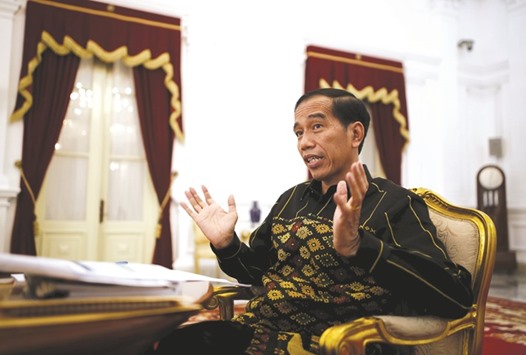Indonesian President Joko Widodo yesterday unveiled plans for a “big bang” loosening of restrictions on foreign investment in nearly 50 sectors to encourage competition in an economy long dominated by powerful vested interests.
The president’s proposal, which will ease rules in the e-commerce, retail, healthcare, movie and several other industries, could pit a relative newcomer on the political stage against an establishment resistant to change.
It would be the most far-reaching yet in a string of stimulus packages rolled out over the past six months to drive industry and employment beyond the economy’s traditional mainstays of agriculture and mineral extraction.
Southeast Asia’s largest economy has been growing at its slowest pace in six years because of falling commodity prices and cooling growth in major trading partner China.
But Widodo told Reuters in an interview at the presidential palace he was very optimistic that growth would rebound to 5.3% this year after a slide to 4.8% in 2015.
His trade minister, Tom Lembong, told Reuters separately that the planned overhaul of the so-called ‘Negative Investment List” signalled a greater openness to foreign investment and would partly prepare the country for free trade agreements, including eventually the Trans-Pacific Partnership (TPP).
“We are seriously considering deregulation across the board, but focusing on e-commerce, healthcare, and creative industry,” Widodo said ahead of a cabinet discussion of the proposals.
“There are 49 sub-sectors (affected) so in my opinion this is the big bang.”
Lembong said retail was also among the sectors that would be opened up, and there would be some degree of deregulation in each of the 16 main sectors on the negative list, which include agriculture, forestry, energy, communication and transport.
In some cases this would raise the limit on foreign stakes in companies from a minority to a majority, helping Indonesia comply with limits on “equity caps” stipulated under the TPP and other trade pacts, like one under negotiation with the European Union.
The healthcare push, which would open up investment in hospitals, clinics and laboratory services, could bring a sea-change in a country where at present foreign medical professionals are not allowed to practice.
Although foreign direct investment into Indonesia has risen in recent years, it remains among the lowest in Southeast Asia in relation to total investment and gross domestic product. Foreign investors have pushed for years for a greater access to opportunities in Indonesia’s vast domestic market, valued at some $840bns at market exchange rates.
Singapore was Indonesia’s largest foreign investor last year, with a 20.2% share of the $29.28bn total realised investment, followed by Malaysia and Japan, the Investment Coordinating Board said last month.
Indonesia has a long history of protectionism, and vested interests have often stood in the way of trade and investment from abroad. The last revision to the negative list was done in 2014 and was seen by many as less investor-friendly. Widodo said that, so far, he has not faced any political backlash or resistance to the steps he has taken towards liberalisation.
“For me competition is very important,” he said. “If we have already launched our deregulation, the bureaucracy and the system must follow the new rules.”
Widodo’s meteoric rise from furniture businessman to president of the world’s third-largest democracy – and the first to come from outside the political or military establishment – was widely seen in 2014 as a watershed moment for Indonesia. Supporters had predicted that the former governor of Jakarta would root out corruption, promote people based on merit rather than connections and create a vibrant economy.
Instead, as economic growth sagged last year, critics said he seemed out of his depth at times and battling to get around politicians determined to preserve the status quo.
A cabinet reshuffle last August, which brought experienced technocrats into his team, set a new tone. Since then Widodo’s administration has rolled out nine stimulus packages cutting red tape, offering tax breaks and loosening regulations.
Widodo said there were two prongs to his growth strategy: deregulation to create competition, efficiency and better services, and infrastructure development. His government has struggled to disburse funds for roads, ports and power stations, and many critical infrastructure projects were hamstrung by bickering ministers and red tape.
However, data released last week showed that investment growth picked up in the last quarter of the year thanks to rising public spending.
The final quarter also saw a jump in foreign direct investment, taking its rise for the year to 2.8% in dollar terms.
Despite the collapse in commodity prices, the mining sector saw the most inward investment, followed by transport, warehouses and telecommunications.
Bank Indonesia spurred growth prospects further in January by cutting interest rates for the first time in 11 months. Widodo said in the interview he wanted to see rates even lower but could not force the hand of an independent central bank.
Meanwhile, Widodo said he would like to see lower interest rates to lift economic growth and bolster industry but he cannot interfere in the monetary policy of the central bank because it is independent.
“I would like to see a lower interest rate but I cannot force Bank Indonesia to cut the interest rate because they are independent and the government respects the way Bank Indonesia conducts monetary policy,” Widodo told Reuters in an interview.
Widodo added that he was very optimistic that the government’s target of a recovery in economic growth to 5.3% in 2016 could be achieved after a slide to 4.8% last year.

Indonesian President Joko Widodo gestures during an interview with Reuters at the presidential palace in Jakarta yesterday. He said he was very optimistic that growth would rebound to 5.3% this year after a slide to 4.8% in 2015.
